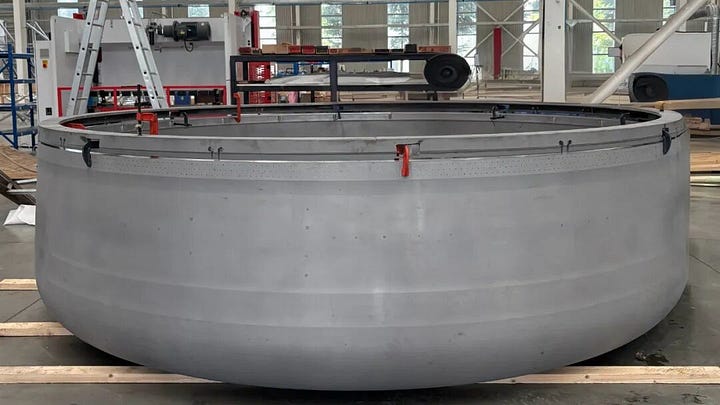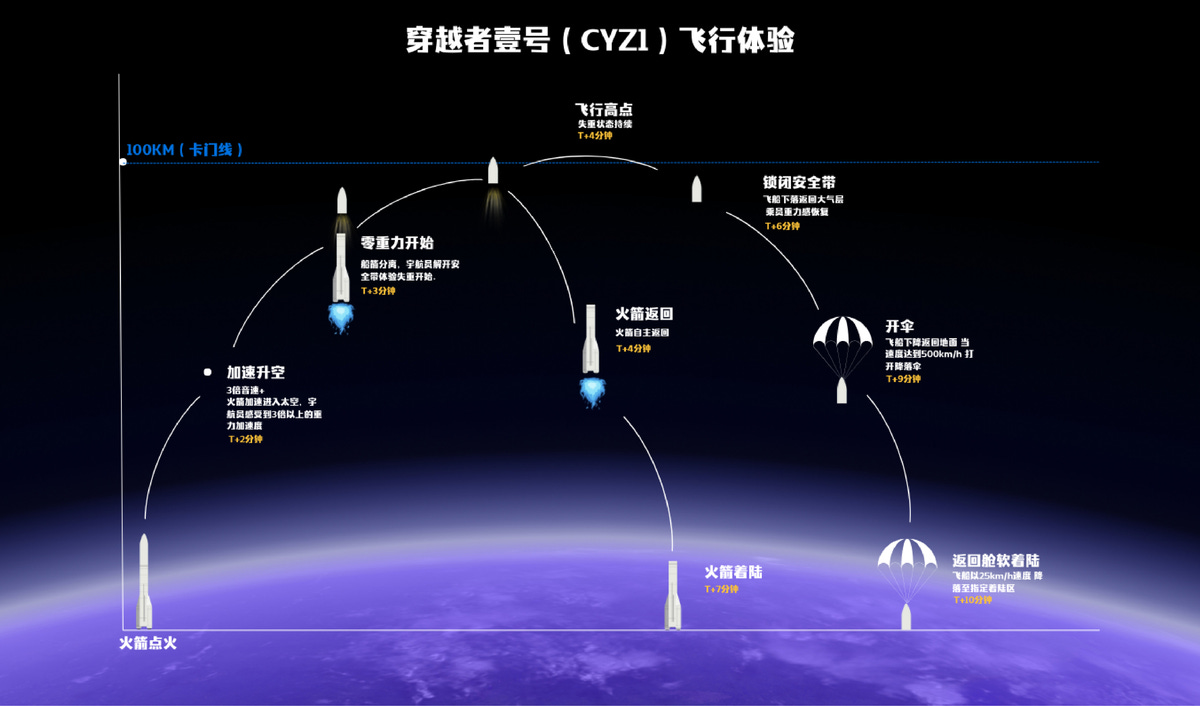Test Tourism Space Capsule Begins Assembly
InterstellOr is aiming to develop a commercial spacecraft for tourist flights into space, beginning in 2028.

Space tourism startup InterstellOr shared on November 13th that a few of its first capsule cabin sections have been joined together following manufacturing efforts throughout the year. Both sections will pave the way for a suborbital crewed spacecraft, named Transcender-1 (穿越者壹号), once tested.
The capsule includes a top cover, cylindrical sidewalls, ring frames, a conical shoulder section, a bottom structure, and gas cylinder support assemblies (most not pictured in the few images). All welds underwent both ultrasonic and X-ray inspections, with the company reporting no defects. Joins between cabin sections reportedly met design requirements.
InterstellOr noted the project required navigating uncharted territory for a Chinese commercial space company, as no non-state enterprise has developed a flight-worthy crewed spacecraft yet. The team completed multiple rounds of technical demonstrations and design iterations across various manufacturing stages, establishing quality control processes throughout production.


In the near future, InterstellOr plans to conduct landing tests with a more complete test vehicle, likely featuring parachutes, a landing dampening system, and control electronics. Those tests may see Transcender-1 be dropped a short height, from an aircraft, or from a booster.
Ahead of those tests, hardware and software tests of systems that will control and protect the capsule have been conducted throughout the past year.
Once developed, the Transcender-1 capsule is planned to carry six passengers above the Kármán line during a ten-minute flight within a 25-cubic-meter cabin that is five meters wide with a handful of large windows to look out of. The capsule will weigh around 8,000 kilograms, having a launch escape system beneath it, while being carried atop of a booster developed by an unnamed external party.
Transcender-1 will face competition from Deep Blue Aerospace’s similar sub-orbital tourism vehicle as well as CAS Space’s, which is set to begin testing before the end of the month. One advantage the two companies will have over InterstellOr is the use of internally developed boosters. International and proven competition will also come from Blue Origin via its New Shepard.
At present, Transcender-1 may begin flying its first missions in 2028. It’s unclear when flights carrying people will begin.
Behind Transcender-1
Founded in January 2023, InterstellOr, full business name Beijing Traveler Manned Space Technology Co Ltd (北京穿越者载人航天科技有限公司), raised its seed round funds in September 2023, with ‘multiple millions’ of Yuan invested into the company by Guangzhou Nanyue Aode Equity Investment Fund Management Co Ltd (廣州南粵澳德股權投資基金管理有限公司). Over a year later, in December 2024, the company completed its angel investment round, raising 30 million Yuan (4.227 million United States Dollars, as of November 13th) solely from QF Capital (啟赋资本).
InterstellOr says they have secured about ten customer tickets for its suborbital flights, priced at 3 million Yuan (around 422,757 United States Dollars) each, selling the first in November 2023. Customers include a Chinese-American poet and possibly a member of the Al Maktoum family of Dubai.
Since InterstellOr’s inception, Lei Shiqing (雷诗情) has headed the company, having gained an interest in crewed spaceflight while studying for a Master's Degree in Applied Psychology1 at Renmin University of China (中国人民大学)2. During her studies, she realised that a psychology-led approach to design can serve as a link to bridge the gap between complex space technologies and common human needs3, allowing for commercial space missions. That brought about the idea for InterstellOr, which was founded on the premise that ‘human-centered, user experience-driven’ design (like SpaceX with Crew Dragon) should influence all aspects of commercial crewed spaceflight development, while maintaining safety standards via automated control systems.
Lei believes that her company can deliver flights at a reasonable cost in a few years, stating the following in April 2024:
“InterstellOr, as China’s first private manned aerospace technology company, focuses on making reusable commercial manned spacecraft. Its establishment also benefited from the development of commercial satellite and rocket companies, making commercial aerospace low-cost and highly reliable. With the gradual improvement of the supply chain system, the cost for ordinary people to go to space can be significantly reduced, and space tourism is just around the corner.”

At the moment, InterstellOr is following its fifteen-year plan to develop three types of crewed spacecraft. The first will be suborbital, currently halfway through its planned four-year development; the second will fly into low Earth orbit, between six to ten years after the company’s founding; and a third will venture into deep space, to destinations like the Moon, around twelve to fifteen years after InterstellOr’s establishment.
This is her second time in tertiary education, previously earning a Bachelor’s Degree from the School of Journalism and Communication at Jinan University (暨南大学), in Guangdong (广东) province, to become a reporter and host at China Central Television (中国中央电视台).
Based in Beijing’s (北京) Haidan (海淀区) district.
Most customers of InterstellOr’s services will not be trained spacefarers.



